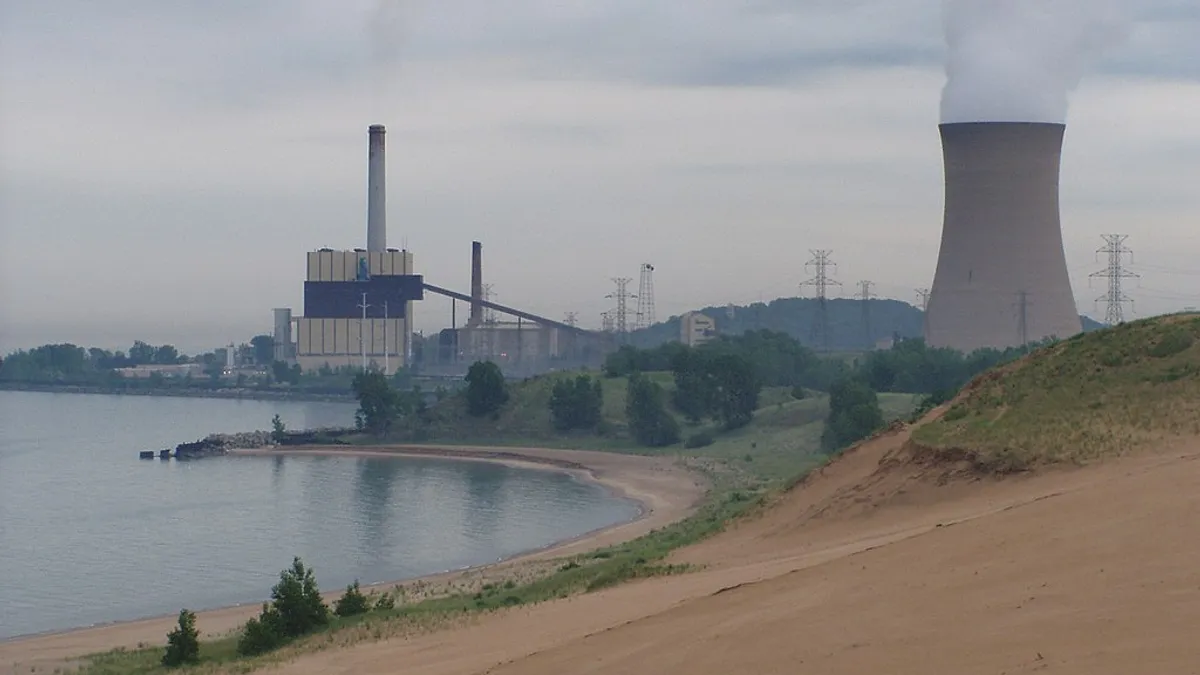Dive Brief:
-
Indiana utilities may be prevented from retiring their coal plants early, or even reducing operations, unless explicitly directed by the Trump administration or through proving public necessity under a bill introduced Wednesday by the state House of Representatives.
-
House Bill 1414 would allow the state's utility regulators to permit a premature plant retirement if the utility is given a direct mandate from the federal government, excluding the U.S. Environmental Protection Agency, or through proving public necessity to state regulators. The bill also specifies a utility may not "materially and adversely affect the operation, safety, capacity, economic useful life, or any other aspect of the electric generation facility," which policy analysts say could impact a broad array of practices that would reduce a power plant's operations.
-
The bill's sponsor Rep. Ed Soliday, R, last year introduced a bill that would place a moratorium on building new power plants in the state, intended to reduce competition for coal-fired plants under pressure from low-priced natural gas and renewables. Coal and renewables interests say the U.S. will likely see more legislation of this kind in coal-reliant states, as plant retirements stack up.
Dive Insight:
Indiana is a traditionally coal-heavy state — it's one of the top 10 coal producers in the U.S., and the sector supports thousands of jobs and adds millions of dollars to the state's economy every year. Coal made up just under 70% of the state's electricity consumption in 2018.
But like many other coal states in the U.S., Indiana is grappling with a new economic reality where low natural gas and renewables prices are pushing coal plants offline early, a trend that's only expected to grow.
"There's definitely tremendous pressure on lawmakers right now in the state from coal interests who have been lobbying very heavily to try and stem the tide of coal retirements that are slated in Indiana," Senior Policy Analyst at clean energy firm EQ Research Ben Inskeep told Utility Dive.
Requiring approval of public necessity through the Indiana Utilities Regulatory Commission would be “redundant” and just increase costs to customers and make plants harder to retire, Executive Director of Indiana consumer protection group Citizens Action Coalition told Utility Dive.
Under this bill, utilities in the state could also reduce their coal generation under direct mandate by the Trump administration which seems "unlikely," said Inskeep. One of President Donald Trump's campaign promises was to end the "war on coal" and leadership in his Department of Energy has also expressed partiality to coal and other fossil fuel generators.
But some of Indiana's major coal consumers — the Northern Indiana Public Service Company and Vectren — have announced plans to move away from coal-fired power and toward renewables and natural gas in resource plans filed last year.
"We think the Indiana legislature and the state's electricity consumers should be concerned about coal retirements for a number of reasons, including the loss of fuel-secure coal-fired power plants that support grid reliability and resilience," President and CEO of coal group America's Power Michelle Bloodworth, who testified in front of the state's energy task force in October, told Utility Dive in an email.
"This bill would make sure that careful thought is given before any resources are retired. We expect that other states might similarly take steps to address this issue in the absence of concrete action from grid operators and other policymakers," including the Federal Energy Regulatory Commission, she said.
Indiana's state legislature last year tried to address those concerns, crafting a bill that would have suspended any utility purchase or construction of generation assets 250 MW or larger until 2021. The bill passed the Republican majority House in April but that portion of the bill was struck just a week later.
Left over from the bill is an energy task force intended to craft legislation that would bring the state's power supply into the 21st century, according to the group. The group is chaired by Soliday as well as state Sen. Eric Koch, R, and is supposed to deliver policy recommendations to the governor at the end of this year.
HB 1414 "is counter to the kind of implicit intent of that policy task force, which was supposed to be determining 'How should Indiana react to the energy transition? 'What policies are needed in place?'" said Inskeep. "This appears to be jumping the gun on that instead of waiting for that policy task force to complete its process and issue recommendations."
The task force's most recent meeting featured presentations from Bloodworth and Mike Nasi, partner at Jackson Walker LLP, on the risks of transitioning away from coal and adding more renewable power on the system, according to the task force's Oct. 31, 2019, agenda.
"We believe that continued movement away from coal-fired electricity generation could lead to further increases in electricity rates in Indiana," Bloodworth said in her testimony. "Prices quoted for wind and solar often omit the substantial cost of transmission upgrades required to connect them to the grid. They also typically ignore the significant costs 'imposed' on other generators on the system."
Soliday is the only sponsor on the bill and Inskeep said the legislature may prefer to wait until the next legislative session to pass major energy policy, since this legislative session only goes until mid-March and the task force's research is ongoing. Meanwhile, energy policy analysts are continuing to watch other states for similar developments as plant retirements continue to threaten the coal sector.
"It does seem likely that the coal industry is not going to take this lying down," he said "They're definitely going to try and do whatever it takes to maintain demand for their product."
Soliday and Koch did not give Utility Dive comment by publication time.
Correction: This post has been updated to reflect utilities can retire plants through federal approval or by proving public necessity to state regulators.















